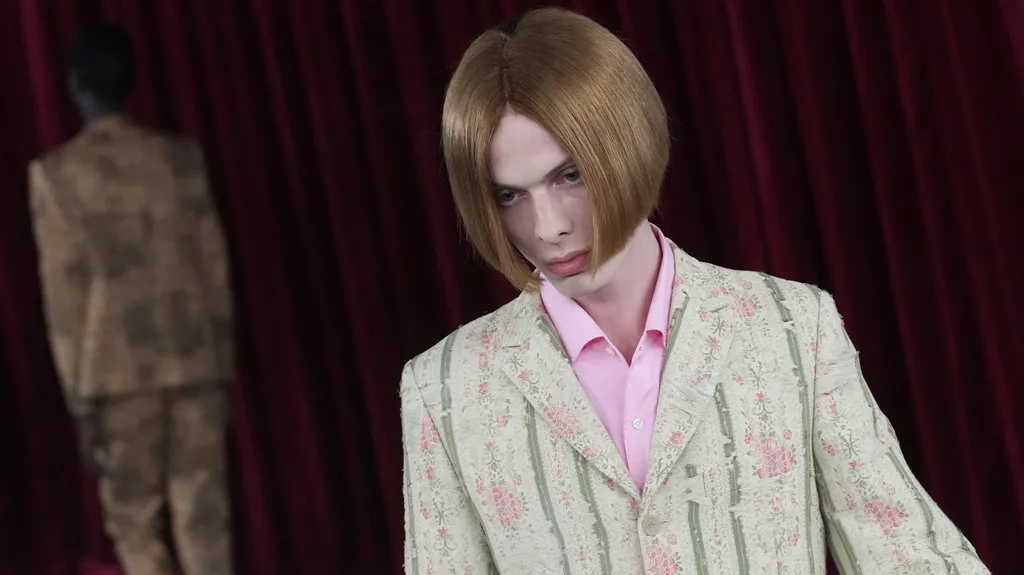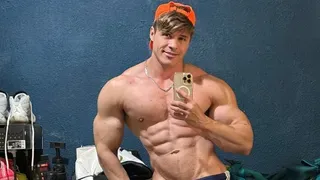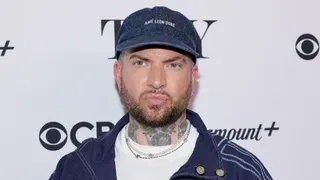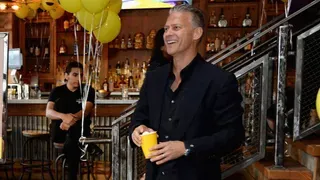June 29, 2018
Embracing 'The Paradox of Porn' with Don Shewey
Kilian Melloy READ TIME: 11 MIN.
Don Shewey is a sex therapist, pleasure activist, Sacred Intimate, and sometime contributor to EDGE. (As a matter of full disclosure, this correspondent has attended two workshops facilitated by Shewey.) He's now written "The Paradox of Porn," a book that any gay man - or straight man, for that matter - would find enlightening and useful: A meditation (or, if you like, semi-user's manual) on pornography.
Porn is, of course, almost universally appealing, at least if your chromosomal code begins with X and ends with Y. It offers the imagination fresh and fertile material for import to real-world experience, and can represent an entree into sexual authenticity. Online or off, porn can show people who assumed they were isolated and all alone in the world that there are others like themselves, and who share their tastes and interests.
But porn, being a commercial product designed to capture eyeballs and net dollars, can also homogenize the sexual imagination in unhealthy ways by showing a too-narrow scope of body types, activities, and modes of sexual response. At a time when a wealth of porn is available in virtually any format, at the touch of a button or click of a mouse, and in unheard-of quantity, a certain poverty of imagination might be observed - and with it, a paucity of representation that can have corrosive effects on self-esteem and connections with others. As Shewey notes in "The Paradox of Porn" - and I am paraphrasing here - the images consumers are fed don't just condense and idealize sex, making it look easy and instant and unfailingly hot while skipping over crucial parts of the process like time spent getting to know each other, negotiations around boundaries and practices, discussions about safer sex, and - once the deed is done - cuddling, talking, and simply enjoying one another in post-coital bliss.
Reading this book, you start making sense of the widespread complaint of loneliness that persists despite a vibrant sexual culture and a plethora of pleasure-centered content; pleasure, it turns out, can have shallow roots that neither reach deep nor sustain over time.
EDGE had chance to chat with Don Shewey about the pleasures, the perils, and the possibilities yet in store for porn.
EDGE: Here's my number one question about porn... I have never liked watching it; the actors never seem very interested in each other; they look bored and cold, and the whole thing is boring. There are some still images I have liked, but overall my feeling is that sex is like sports: I would rather be doing it than watching it. Does this make me a bad gay? Am I not normal?
Don Shewey: Yes, Kilian, you are a very bad gay. Go to my room!
I use "porn" to refer to the widest possible range of erotic imagery, from old-school beat-off skin mags to commercially produced full-length videos, from Tumblr blogs to pic-sharing on hook-up apps, from ancient Greek pottery to whatever got invented just last week. Every gay man has his own individual quirky tastes in images and technology, and you can tell which platform works for you because it gets you turned on and craving sex.
EDGE: I wanted to start with a personal question because you make your book "The Paradox Porn" very personal. Did you hesitate to include any of the details about your own experience, tastes, etc.?
Don Shewey: Of course, but I didn't want to write from the POV of a distant uninvolved observer. By sharing some of my own personal experiences, I hope to encourage readers to run their own internal memory-movies and to think about their own experiences with porn with the same level of curiosity and specificity.
EDGE: What was the spark of this book for you? What moment or experience made you decide, "You know what we need is a good book about the pros and cons of porn, and I'm the one to write it!"?
Don Shewey: I mention in the book a key inspiration for me, a dinner party where someone abruptly asked, "Why are gay men so bad at having sex?" That isn't really my experience, but I knew what he was getting at. And I had a lot of evidence at hand, from my therapy practice, that what gets in the way of good sex for a lot of guys is trying to reproduce in their personal sexual interactions what they've seen in the highly choreographed, edited medium of pornography. My intention in writing the book is the same one that drives my professional practice: to encourage and support gay men in having more pleasurable and more satisfying sex. I wanted to share more widely the questions, discoveries, curiosities, and wisdom that I encounter every day of my working life.
EDGE: Is it possible that experiencing porn could be a spiritual experience? Could it be similar to the ancient sexual rites in pagan temples you refer to in the book?
Don Shewey: In the pagan tradition, all things are sacred. It's all a matter of how you approach them. To the extent that for many guys porn, masturbation, and sex are intricately intertwined, your attitude about porn is super-related to your attitude about sex. There are many traditions of sacred sex and sex magic that center on mindfulness, ceremony, intentional practice. There's nothing wrong with casual sex or casual porn-watching; at the same time, if it's gone a little stale for you, taking the time for ceremonial self-pleasuring can be an enjoyable practice. I learned a lot about healing the split between sexuality and spirituality from Joseph Kramer, who created the Body Electric School and now runs the New School of Erotic Touch. He has devised a whole practice of mindful masturbation that he calls Porn Yoga. Google it.
EDGE: Here's something that jumped out at me: The phrase "Compare and despair." You point out that thanks to porn, which sells an idealized view of human bodies, lots of guys end up feeling inferior due to their body shape, or their hairline, or other physical characteristics, and you talk about ways to break this habit of comparison and despairing. Would you mind summarizing your advice for our readers here?
Don Shewey: This is a phenomenon that is widespread in contemporary culture. It is a deep existential challenge to make yourself the center of your experience, to give value to your own body, your own desires, your own pleasures, regardless of someone else's experience. This is the essential wisdom I gleaned from Alan Downs' important book "The Velvet Rage." In his analysis of gay male emotional development, a key process is making the transition from the time in your life when you put tremendous value on external validation - what other people think of you - to the time when (if you're lucky enough to get there) you have learned to validate yourself, which is one way that he defines authenticity. It takes work to get there - inner work, therapy, meditation, spiritual practice, reading, taking a break from social media.
EDGE: You bring up a fascinating point in the book that sexual experiences and sexual desire ebbs and flows and changes within the context of an erotic encounter, as well as over the course of a lifetime. Should we want to challenge ourselves to develop new tastes and passions, and not stay stuck on the same pre-programmed, market-fed images and tropes?
Don Shewey: I have an aversion to anyone telling me what I should do, especially people I don't know, so I rarely feel inclined to say what someone else should do. I do have a deep abiding desire to encourage people to wake up to the joy of life in a body and to support gay men in having more pleasurable and satisfying sex. So in one sense, if it ain't broke, don't fix it. But if your sex life feels stale, arid, or unsatisfying, there are lots of ways to expand your erotic horizons.
EDGE: Porn is a double-edged sword - it can educate and liberate us, and this is a central theme of your book, but it can also enslave us and, I don't know... degrade us? Aside from making us miserable, can porn be, as is often charged by self-appointed morality police, debasing?
Don Shewey: My friend Wayne Hoffman, who's an excellent journalist and novelist, cautioned me about ascribing too much agency to porn itself. "Porn does this, porn does that." It's really up to you and how you use it. Watching porn online or on your phone can definitely be addictive - when hours go by and you're neglecting other aspects of your life, that can become a problem. Is that caused by porn or by your inability to walk away from the device? I've definitely seen porn images - pictures and videos - of sexual activity that looks horrifying and unpleasant. Doesn't turn me on. I wouldn't want to engage in that myself. But erotic desire is deeply personal and individual. I go by the golden rule - don't yuck my yum, and I won't yuck yours.
EDGE: We hear so many claims that the Internet makes us lonelier and more isolated; and in your book you make a case for how relying on porn instead of genuine human contact can have the same result; and obviously, the way gay male sexuality has migrated online and out of bars and other public spaces has had an isolating effect. But are there hopeful signs, too, that online sexuality can enhance our lives and bring us closer to wholeness?
Don Shewey: Ready access to gay porn online has been a blessing to a lot of people in the early stages of coming out, who are too young or too shy or too frightened or live in places where there is little or no out gay culture. When the AIDS epidemic crashed into our lives in the 1980s, it scared a lot of guys away from having sex with other people. Especially if you were a teenager just discovering your sexuality, AIDS made being gay very scary. It turned out to be advantageous that home video arrived at the same time, so it became increasingly easier for people to explore gay sexual imagery in the privacy of their own homes and gain some sense of pleasure and self-knowledge that they weren't getting anywhere else in their lives, without subjecting themselves to the risk of disease.
EDGE: One interesting phenomenon we notice at EDGE in terms of news is that our readers seem to respond quite a lot to stories about "porn stars." Why is that? Do consumers of porn develop emotional attachments to their favorite adult film actors the same way we might have a crush on a mainstream actor? Is there simply something fascinating and mythic about a man so confident that he'll have sex in front of an audience?
Don Shewey: Again our contemporary media culture loves to create celebrities. If you watch a lot of movies, you get fixated on movie stars. If you listen to a lot of rock music, you develop intense feelings about rock stars. If you look at porn every day for five or ten or 15 or 20 years, you almost inevitably develop an attachment to certain porn stars. We project a lot of shiny qualities onto the stars we like, and we want to emulate them. There is something beautiful and fun and devotional about investing emotional energy in reading about and fantasizing about stars. As with anything, though, the shadow side emerges when you start denigrating yourself as less than - going back to "Compare and despair." Porn stars make sex look effortless and wildly exciting, and we admire that and want to have the experience they're having. But of course any porn video or images you see have been carefully edited to omit all the messy stuff that happens in real life.
EDGE: I read recently about schools starting to think about educating teenagers around porn for the very reasons you describe in terms of porn's downsides: It transmits unrealistic expectations about what constitutes attractiveness; it models cold and even brutal conduct around sexuality and interpersonal relationships; it prioritizes mechanical acts over emotional connection. When you work with Millennials as a sex therapist, do they - more than other generational cohorts - display porn-related dysfunction or unhappiness?
Don Shewey: Watching a lot of porn does hypnotize one into thinking that the sex you have in your own bed should look like the sex you see in porn - lots of slamming and spitting and punching and double penetration and group sex. If that's not what your sex life looks like, or you try to do those things and they're not enjoyable, you can start thinking there's something wrong with you. One of the saddest things a client ever said to me was "I watched 20 gang-bangs online before I ever kissed a boy." That kind of distorted sense of sexual norms can definitely have a negative impact on your sex life. From watching a vast array of porn sex, guys can internalize the assumption that anyone they meet will expect them to be a kind of sexual athlete. "If I do anything, I have to be willing to do everything. And if I'm not available for everything, then maybe I'd better do nothing." When really what's most satisfying is just to connect with someone in simple, honest ways. There's a big gap between how things look and how things feel, and these days it's often surprisingly difficult to prioritize the latter over the former.
I will mention a phenomenon that has gotten normalized that I think is worth evaluating, which is this thing nowadays where the camera becomes a crucial part of a sexual interaction - taking pictures or videos while you're having sex. I've done it myself. I do it myself. Sometimes to create a souvenir of a fun encounter. Sometimes to preserve a hot image to relish later. Sometimes to build up an archive to tantalize future partners. But it bugs me when performing for the camera takes up too much energy. I feel sad when I watch videos where that seems to be happening, because I wonder if the guys involved are missing out on the pleasure of the connection in the present moment by being so intent on capturing the fucking/sucking/cumming on camera. I feel the same way about someone who seems to be more interested in having sex with the bottle of poppers than in having sex with me.
EDGE: Some people seem to characterize looking at porn as a form of infidelity. Is this part of the problematic aspect of porn?
Don Shewey: Every intimate relationship requires negotiating how you deal with other people - looking at them, talking to them, flirting with them, fooling around with them, texting or sexting with them. Some guys feel threatened when their partner expresses sexual interest in anyone else, and that's something the two people have to work through. Someone who feels insecure needs a lot of reassurance.
EDGE: In an ideal world, what would a healthy porn habit look like? I mean, how would an enlightened, well-educated, non-racist, non-sexist philosopher king who wasn't afraid of his own genitalia use porn to enhance his life, and maybe the lives of others?
Don Shewey: Any healthy diet - whether it's food, media, or porn - is one that's balanced. All things in moderation, including moderation. A good rule of thumb is doing what makes you feel good and good about yourself.
EDGE: Dave Wavey's Himeros tv is advertised as "Like porn but better," and he might have a point; his videos are well produced, they look good, and they even have a little poetry about them. Are we likely to start seeing more porn like this, with some thoughtful content?
Don Shewey: Antonio DaSilva is another filmmaker who is thinking a lot about the future of porn, especially as it merges with social media and advanced digital technology (check out his film "Spunk").
I think for better or for worse, porn is about fantasy. It's always been true that some people prefer soft-core, romantic erotic imagery to hardcore porn. Even in this video-centric world, lots of guys still prefer to read stories to get them going rather than look at pictures. It's your challenge and your invitation to recognize the difference between fantasy and reality -- to let fantasy stoke your erotic imagination and not confuse it with documentary reality.
"The Paradox of Porn" ($19.99) will be available from Joybody Books on July 15. For more abut Don Shewey, go to https://www.donshewey.com/
Kilian Melloy serves as EDGE Media Network's Associate Arts Editor and Staff Contributor. His professional memberships include the National Lesbian & Gay Journalists Association, the Boston Online Film Critics Association, The Gay and Lesbian Entertainment Critics Association, and the Boston Theater Critics Association's Elliot Norton Awards Committee.





